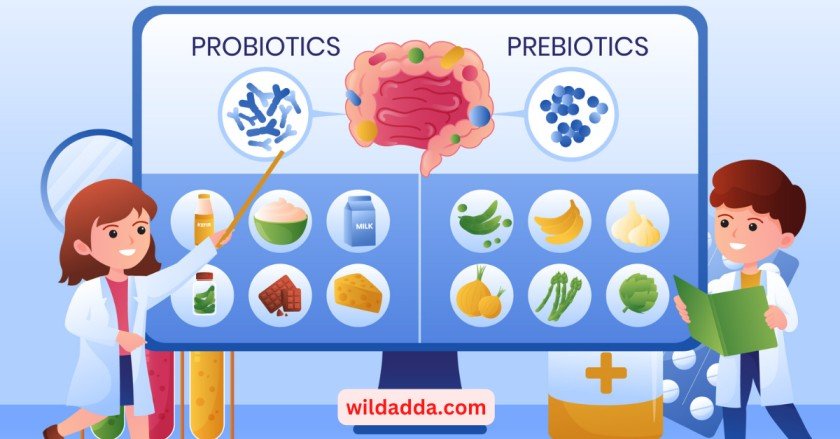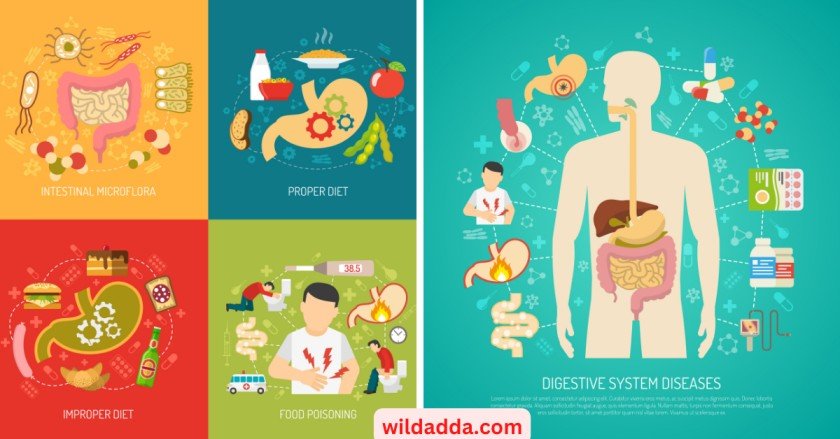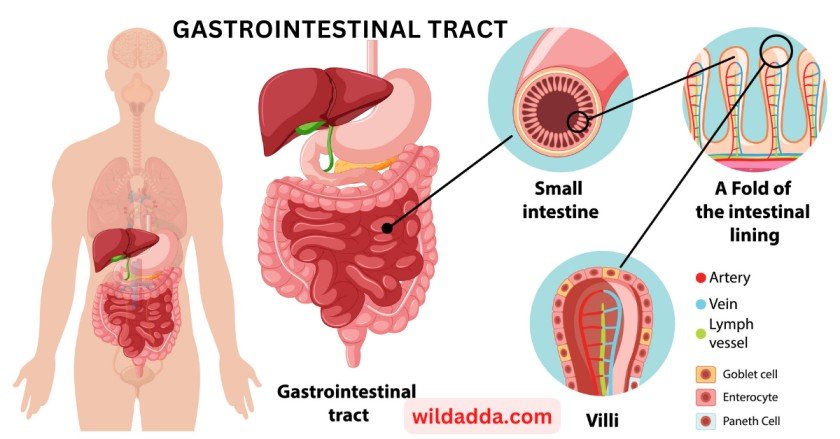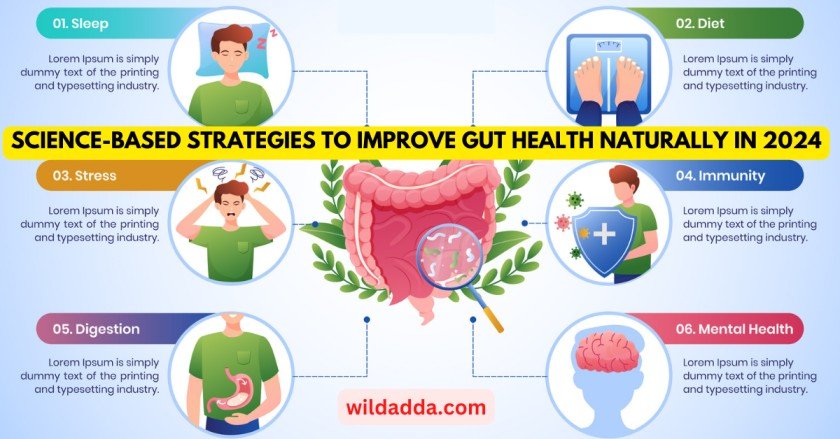Table of Contents
Assess Current Lifestyle Factors Impacting Gut Health
The gut interacts with virtually every bodily system, making inventory of current dietary habits, medications, stress triggers and toxin exposures pivotal when designing a specialized gut healing plan. Keep a detailed journal tracking lifestyle elements and symptoms to pinpoint triggers disrupting digestive equilibrium. Once irritants are identified, customize an elimination diet, identify calming modalities taming stress responses, consult with doctors about alternatives for necessary medications, and reduce use of common gut-disrupting culprits like processed sugars, chemical additives and alcohol. Precision supports progress.

Shift to an Anti-Inflammatory Whole Foods Diet
Whole, fiber-rich plant foods feed microbiome diversity essential for gut lining strength and function while reducing inflammation. Aim for 8-12 servings daily of mixed veggies, low-sugar fruits, ancient grains, nuts/seeds and anti-inflammatory spices like turmeric, ginger and garlic. Support natural detoxification pathways by emphasizing sulfur-rich cruciferous veggies and high antioxidant fruits packed with polyphenols. Manage any carbohydrate sensitivities by balancing fiber-rich choices with adequate protein and healthy fats at meals for steady, stable blood sugar. Stay well hydrated with purified, electrolyte-rich beverages. An anti-inflammatory whole foods diet serves as healing gut protocol cornerstone.
Strategically Supplement with Probiotics and Prebiotics
While diet forms the firm foundation, targeted supplement regimens further catalyze optimal microbiome balance. Start by identifying personalized probiotic needs – multi-strain, high diversity blends with 20-30 billion CFU potency from reputable brands create resistance against pathological strains. Pair daily probiotics with prebiotic fibers like acacia and inulin that act as fuel for beneficial bacteria. Finally, digestive enzymes ensure proper absorption of nutrients that gut bacteria require to flourish. Discuss customized supplementation with your functional health practitioner.

Reduce Stress Through Lifestyle Adjustments
Since systemic stress directly damages intestinal lining permeability and inflames digestion, effectively managing daily pressures becomes imperative. Tactics like meditation, breathwork, nature immersion, yoga, massage, cognitive behavioral therapy and addressing negative self-talk patterns through journals, mantras or counseling help reverse stress-induced reactions. Protect nourishing sleep, relationships and community connection for mental equilibrium. Assess reasonable ways to reduce avoidable stressful situations. Our mindset and nervous system equilibrium sets the stage for gut wellbeing.
Here is the vegetarian gut health diet chart formatted as an easy-to-follow table:
| Time | Food | Key Nutrients & Benefits |
|---|---|---|
| 6:30AM | Warm lemon water | Vitamin C to stimulate digestion & clear bowels |
| 7AM | Ginger turmeric tea | Anti-inflammatory compounds soothe intestinal walls |
| 8AM | Chia pudding with berries | Fiber, protein and antioxidants to promote bowel movement |
| 10AM | Avocado and veggie whole grain toast | Healthy fats aid nutrient absorption & prebiotic fiber feeds microbiome |
| 12PM | Tofu veggie stir fry with quinoa | Plant-based protein is easily digestible with gut-healthy complex carbs |
| 3PM | Beet ginger kombucha | Natural probiotics support microbiome diversity & balance |
| 5PM | Roasted chickpea & cauliflower taco bowl | Resistant starches provide prebiotic fiber for bowel regularity |
| 7PM | Coconut curry with sweet potato & spinach | Anti-inflammatory spices counter gut irritation and swelling |
| 9PM | Tension tamer herbal tea | Soothes and relaxes digestion pre-sleep |
This diet provides an abundance of easy-to-digest plant foods with anti-inflammatory and gut supportive nutritional properties. It emphasizes whole, real foods over processed ingredients, lean proteins at each meal balanced with fiber-rich carbohydrate sources, healing spices and teas, with properly timed nutrients for improved digestion.
It can benefit those looking to reduce inflammation, optimize nutrition, support microbiome diversity, improve regularity and provide the building blocks to repair gut barrier function over time through food as medicine.

This diet would need adjusted for nut or soy allergies, grain-free needs or raw vegan lifestyles. Work with your functional health provider before making dietary changes if managing a severe chronic gut condition.
Support Microbiome Diversity Through Natural Approaches
Research shows that microbiome diversity and microbial gene expression directly impact digestive health and immunity. Supporting the unique ecology already flourishing inside your gut brings stability. Consume traditionally fermented foods like kimchi, kefir, sauerkraut and kombucha to seed diverse organisms. Stay active to maintain optimal transit times, while also supporting liver function for efficient waste elimination. Minimize exposure to environmental toxins throwing off intricate balance. When applied with consistency, evidence-based gut healing protocols enrich and sustain microbiome diversity over time.
Through holistic lifestyle adjustments fueled by dietary upgrades, stress management skills and targeted supplementation, those struggling with suboptimal gut health can facilitate deep transformation strengthening digestive vitality from the inside out in 2024 and beyond. Commit to the progression pathway ahead this year.

FAQS
- What foods help improve gut health?
Top gut-friendly foods include fermented choices like yogurt, kefir, kimchi that contain probiotics. Prebiotic-rich options like garlic, onions, leeks, asparagus, and oats feed good gut bacteria. Anti-inflammatory whole foods minimize gut irritation – cruciferous vegetables, bone broth, salmon, avocados, coconut products, and antioxidant fruits like berries neutralize free radical damage.
- How can I restore my gut health naturally?
Natural ways to restore healthy gut function include removing trigger foods and opting for nutritious anti-inflammatory whole food choices rich in prebiotics and probiotics. Strategic supplementation with probiotic capsules, digestive enzymes and gut-repairing nutrients provides additional support. Reducing stress through meditative, relaxing activities also proves critical for gut equilibrium.
- What is the best probiotic for gut health?
The most effective probiotic for improving gut health contains multiple diverse bacterial strains like Lactobacillus and Bifidobacterium species. Multi-strain broad-spectrum probiotic supplements with at least 20-30 billion colony forming units provide therapeutic benefits for digestion, immunity and intestinal lining integrity. Pairing probiotics with prebiotic fiber ensures healthy bacteria thrive.

- How long does it take to heal gut naturally?
Those with mild gut imbalance can experience noticeable improvement through consistent natural protocols within 4-6 weeks. Moderate cases require at least 3-6 months for tissues to regenerate and inflammation to resolve. Severe leaky gut and microbiome disruption may take up to 12 months to facilitate deep healing through dietary, lifestyle and targeted supplement adjustments. Patience during the intricate process allows proper healing time.
- What is the best thing to drink for your gut?
The best gut-healthy drinks include purified water to maintain hydration critical for all digestive processes and waste elimination. Beneficial fermented beverages like raw kombucha, kefir or kvass help recolonize good bacteria. Organic aloe juice soothes intestinal lining. Herbal noncaffeinated teas like marshmallow root, ginger, chamomile and peppermint promote relaxation while reducing spasms, gas and nausea. Bone broth repairs damaged gut barrier tissues.
